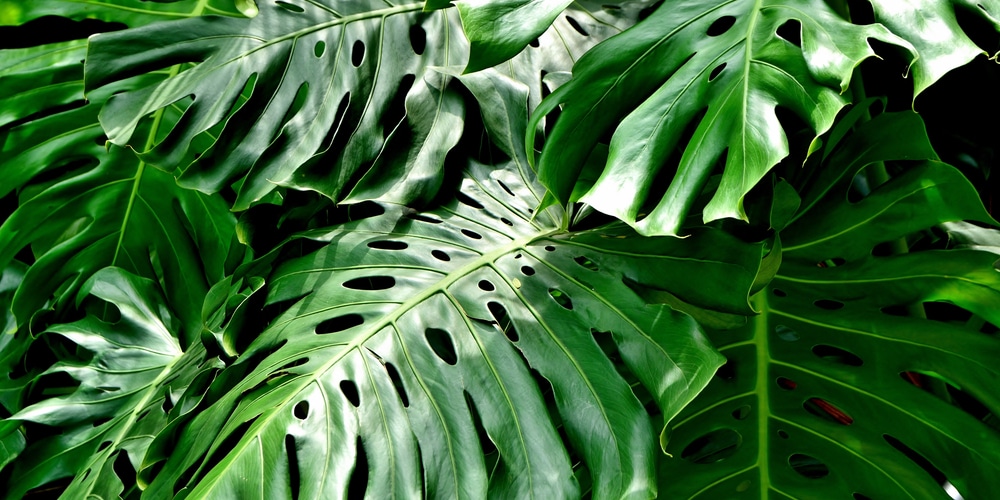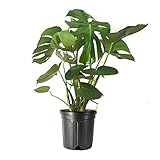Split-leaf philodendrons are fast-growing and easy to propagate. They can be grown from cuttings and given to friends and family as gifts. In just a few weeks, a cutting will develop a robust root system with the right care and attention.
After new roots grow, the plant will start to sprout new foliage, as long as it’s kept in the correct condition and has adequate light, warmth, and humidity. Let’s look at how to propagate a split-leaf philodendron.
Step by Step Propagating Instructions for a split leaf philodendron
Split leaf philodendrons can be propagated using a cutting. When propagating a plant, you should only take cuttings from a large, mature plant. Cutting pieces off a small philodendron isn’t a good idea as your plant may struggle to grow.
It’s best to wait until the spring to propagate your split-leaf philodendron so that it has the whole growing season to put on new growth. You can also propagate in the summer if you live in an area with an extended growing season.
If you have a large philodendron and are looking to grow a new plant, follow these simple steps:
1. Sanitize your tools
The first step in propagating a split leaf philodendron is to get your tools ready and then decide which part of the plant you will remove. You’ll need a sharp knife, scissors, or a floral pruning tool. Ensure that any tools you plan to use are clean before you proceed. You can wipe the blades with rubbing alcohol.
Alternatively, dip the blades in a solution of water and bleach, then rinse your tools thoroughly. You can leave your tools outside in the sun to dry. The sun’s UV rays can also be used to kill bacteria.
Sanitizing your tools is an essential step as it kills bacteria and reduces infection. Plants will stay healthy if you use clean, sharp tools.
2. Find a healthy offshoot
You should ensure the cutting you take from your plant looks healthy to improve your chances of success. Have a look around your plant’s base for a healthy shoot that’s between 6 and 8 inches tall. It’s best to choose a shoot with new leaves that are small and just starting to grow. Also, look for new leaf nodes and choose an offshoot that has at least two. A cutting that already has leaves growing will grow into a small plant quickly.
3. Cutting the stem
The third stem in propagating a split-leaf philodendron is cutting your chosen stem. It’s best to wear gardening gloves when doing this job. Cut the stem off as close to the soil as possible, using scissors or floral snips. Once you’ve taken a cutting, you can place it into a glass of water to help keep it hydrated.
4. Get the pot ready
Fill your pot with a mixture of house plant soil, perlite, and peat moss. Alternatively, you can use tropical pre-mixed soil. Add a layer of gravel or stones at the bottom of the pot to improve drainage. Then moisten the soil before planting.
5. Plant your cutting
You can now insert your cutting into the soil. Press the soil around the stem firmly and then water the cutting if necessary to improve soil moisture.
6. Caring for your cutting
Place your cutting in a warm environment in indirect sunlight. You may like to place your plant near a window or outdoors in a sheltered spot. Care for your plant as you would any other tropical plant. Ensure the soil remains moist. You can also use a misting bottle to spray your cutting’s leaves daily. This will help to improve humidity and encourage the leaves to grow.
7. Check the roots
After a month, you can try to gently lift up the cutting. If you feel any resistance, this is an indication that your cutting has grown roots.
8. Repot after one year
It’s best to keep your plant in its original pot for at least a year. This will allow the plant to grow a good root system and put on new growth before its disturbed. After about a year, your can repot your plant into a larger pot if necessary. If you live in USDA zones 9 to 11, you can plant your philodendron outdoors in a flower bed.
- Live Philodendron Monstera Plant – Iconic houseplant with large, split-leaf foliage that adds bold, tropical texture to indoor décor
- Fast-Growing & Climbing – Ideal for trellises, moss poles, or large floor planters; its vining habit makes it great for vertical interest
- Thrives in Bright, Indirect Light – Grows best in well-draining soil and moderate watering when the top inch of soil is dry
- Air-Purifying & Statement-Making – Naturally cleans the air while serving as a stunning focal point in living rooms, offices, or sunrooms
- Perfect for Jungle-Inspired Décor – A must-have for plant lovers seeking a bold, dramatic plant with easy-care requirements
Conclusion: Propagation is a Great Option for Split Leaf Philodendrons
Split leaf philodendrons grow well from cuttings. Choose a small healthy stem and plant in well-draining soil. These fast-growing plants will develop strong roots after about a month and will then start to produce new foliage. Only propagate using a mature plant and leave your cutting in a warm area in indirect sunlight.
Related:
Last update on 2025-04-20 / Affiliate links / Images from Amazon Product Advertising API

